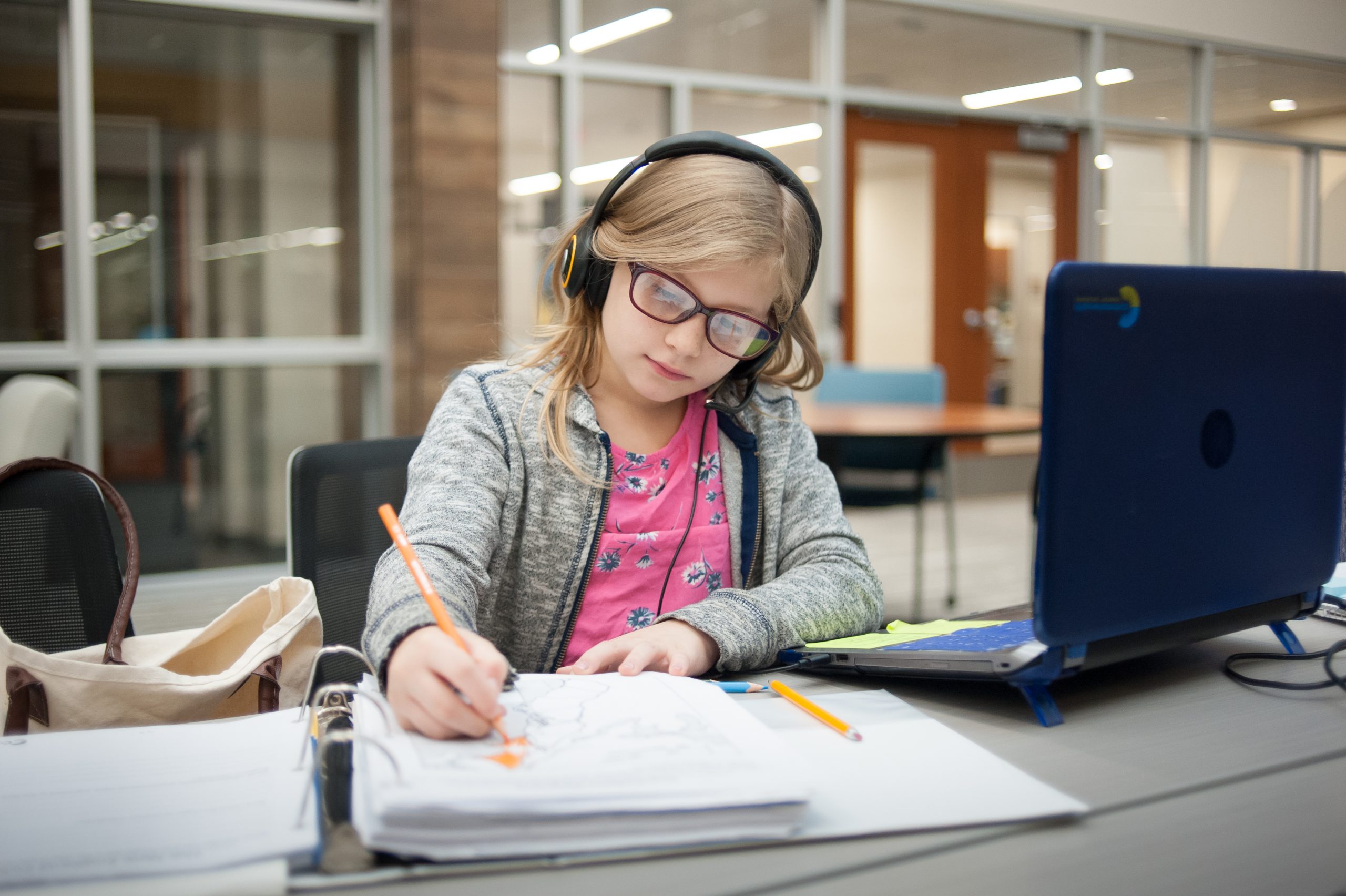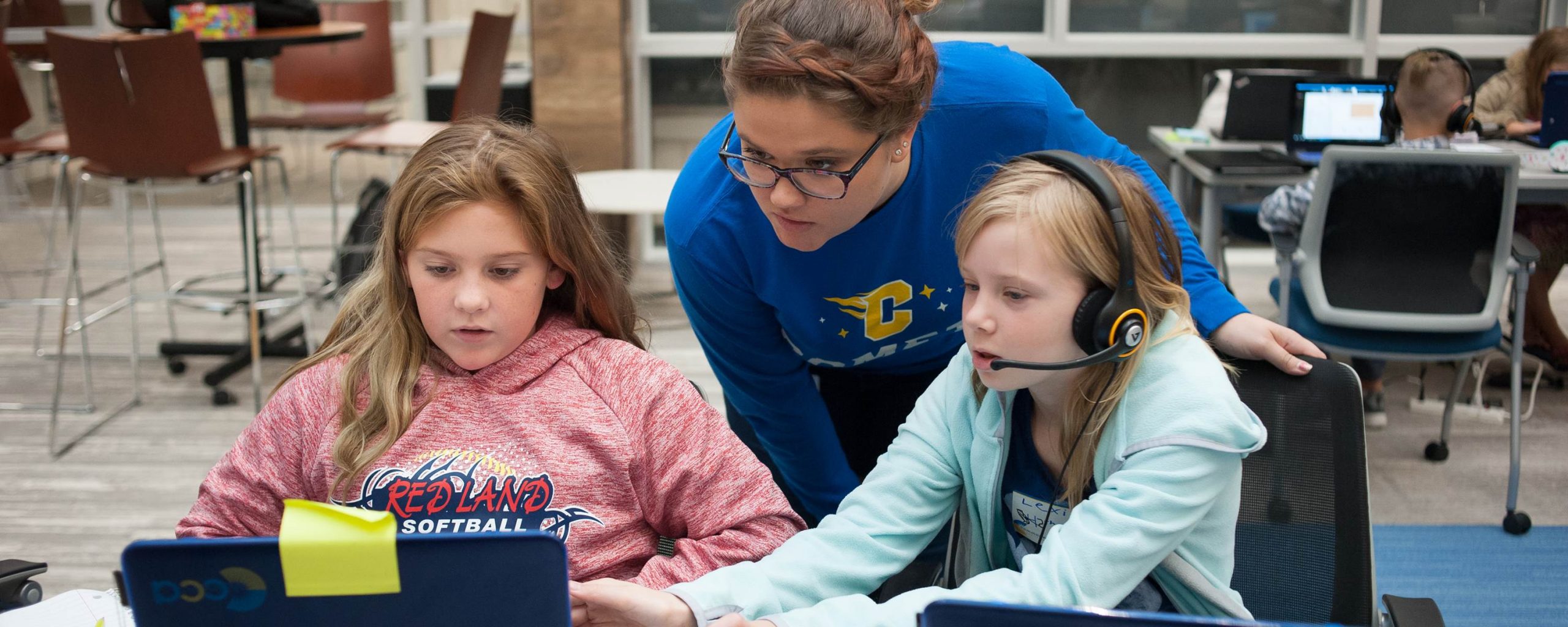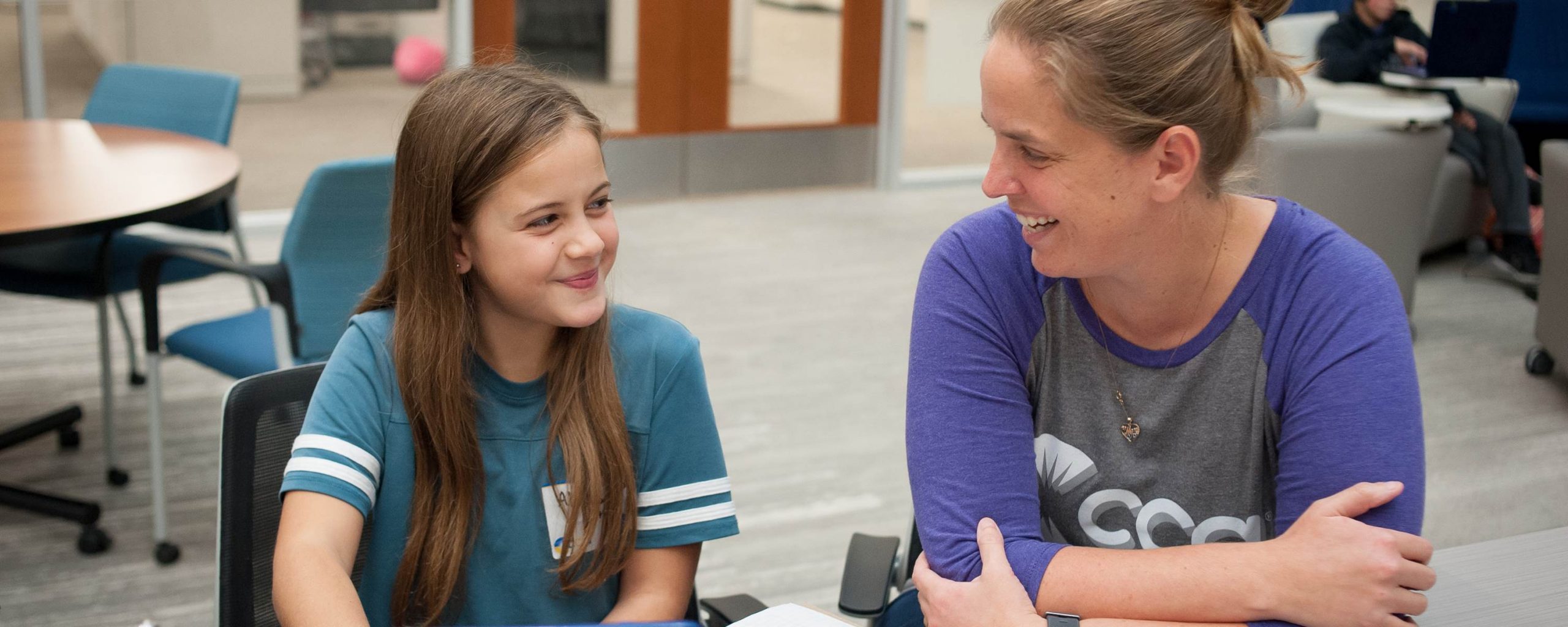Enrollment Now Open for Second Semester. Click Here
Enrollment Now Open for Second Semester. Click Here

Teachers play a vital role in helping ELs develop language skills as they learn grade-level content. They can inspire students to believe in themselves and overcome the common challenges of learning a new language. A great teacher helps students feel understood, supported, and motivated regardless of their language skills or background. Here are a few ways teachers can encourage language development and learning for EL students:
A personalized education allows ELs to move at their own pace and select courses that match their skills and interests. For example, at CCA, students can explore various industries to discover their interests and prepare for a future career. When teachers connect a student’s passions and background to learning, they are more driven to learn.
As part of a personalized education plan, teachers can also work with students to set their own language development goals. A student might create the goal of reading a book in English, for instance, or practicing their new language skills with native English speakers. In general, goals provide direction, add meaning to learning, and offer a sense of accomplishment once they’re reached.
At CCA, we collaborate with each student and their parents to create a tailored academic curriculum that meets their needs, interests, and learning styles. Our students have flexible learning options and various levels of support so that they can thrive.
As we mentioned in the previous chapter, ELs need structure in the classroom to feel secure, comfortable, and ready to learn. Teachers can create a structured online learning environment by opening with a video greeting and following a routine. When students know what to expect when they join a virtual classroom, they can relax and focus on learning.
CCA students choose their own schedules to create a structured routine that works best for them. For instance, if a student feels more comfortable watching a recorded version of math class but prefers participating in an ESL lesson in real-time, they have that option. Teachers work with parents and students to design a routine that fosters their growth.
Classroom participation is a key aspect of language development. When students participate, they become actively involved in their learning. They can ask and answer questions, practice speaking the language, and discuss classroom material with other students. Participation helps build an EL’s confidence and is more engaging than listening to a teacher talk the entire class.
Teachers should look for ways to encourage ELs to participate. They might pair ELs with other students who share the same home language or add more time for students to share and listen to ideas. Teachers should also encourage students to ask questions by thanking them for asking. It’s important students learn in a supportive, low-anxiety environment, so they feel comfortable speaking and taking risks.
Teachers who use differentiated instruction consider each student’s learning style. For example, if a student prefers to learn by watching a video, the teacher will provide a video to teach a new concept. With differentiated instruction, teachers offer various resources to accommodate each student’s unique needs and preferences. It is an effective strategy for creating a supportive and stimulating learning environment.
Creative assignments can keep students engaged and get them excited to learn. Creativity can also aid comprehension. Teachers can allow students to choose how they want to express what they’re learning creatively. They should also look for fun and artistic ways to incorporate students’ background knowledge, skills, and interests into classroom activities and assignments. For example, teachers might ask students to act out their favorite movie scenes in English or ask ELs to use drawing tools to communicate their ideas. There are many ways to make language development enjoyable and inspiring.
Teachers should frequently check in with ELs to ensure they’re learning the content. They might ask students to give a thumbs up or thumbs down after providing instructions or explaining something to see if they understand. Teachers can also set aside time each lesson to chat with students one-on-one to answer questions and offer their support. Educators must consider each student’s needs when choosing how often to check in and what communication method to use.


Like teachers, parents play a major role in an EL’s academic success. There are plenty of ways parents can support ELs and help them learn at home, such as:
If parents feel unprepared to assist their child with schoolwork due to their language proficiency level, teachers are available to help. At CCA, we provide the support parents and families need to help their child reach their academic goals.
If you’re interested in enrolling an English learner in a Pennsylvania cyber school or want to learn ways to support your child’s education, we’ll be happy to answer any questions you may have. We also encourage you to explore the following resources:


According to the Stanford Center for Education Policy Analysis, nationally, around 700,000 students were dually identified as an English learner and a student with a learning disability. An English learner with a disability is eligible for both special education and ESL services. These students may have unique requirements for learning an additional language and expressing what they’ve learned. It’s critical dually identified students gain access to tailored teaching strategies and educational accommodations as soon as teachers or parents identify learning issues. When students’ needs are met, they are more likely to succeed.
However, educators and parents must first determine whether academic struggles are due to a learning disability or other factors, such as the learning environment. Teachers and parents must work together to assess a student and develop a supportive, individualized educational plan.
Educators at CCA use multiple information sources, including assessments and family input, to create individualized education plans and provide accommodations for ELs with special education needs.
A day in cyber school for an EL student depends on their curriculum and needs. In general, ESL lessons will be incorporated into students’ coursework. As an example, an elementary EL’s week might look like this:
| Monday | Tuesday | Wednesday | Thursday | Friday |
|---|---|---|---|---|
| Be introduced to a new topic and get assigned two learning activities. | Read from books aloud with other students. | Work on two learning activities independently and write a half-page response. | Submit their response and meet with their teacher and other students virtually to have a discussion. | Receive feedback and comments about their response and listen to other examples. |
At CCA, students attend virtual classes, complete assignments, and take tests at times that work best for them. A flexible schedule allows students to learn at a comfortable pace and develop their own routines. Here’s an example of what a day at CCA for a fourth-grade student might look like:
As a CCA student, ELs learn alongside peers with similar levels of English proficiency. Each student’s ESL teacher collaborates with their other teachers to monitor progress and ensure their language needs are met. Every day, ELs receive instruction to help them achieve English proficiency and meet state academic standards.
Being an EL student certainly comes with unique challenges, but students don’t go through learning a new language alone. Teachers are specially trained to support ELs and modify instructions, assignments, and assessments according to a student’s needs. Teachers and parents can work together to help students recognize their potential and reach their academic goals.
Cyber school, in particular, can help students overcome the challenges of learning a new language because it allows them to develop skills at their own pace. At CCA, we aim to help all of our students identify their educational goals and passions to build critical skills and plan for their future. Our EL students can expect the following benefits of online classes:
Our certified ESL teachers provide targeted language development instruction, meaning they consider ELs’ knowledge and teach them accordingly.

ELs have access to various exciting educational resources, including National Geographic learning programs, which incorporate games, stories, and real-world content.

To help parents or guardians succeed in their roles as learning coaches, we provide translations and interpreters for all communications between CCA and a student’s home.

ELs are taught in small groups. This allows our teachers to deliver individualized instruction and closely monitor each student’s progress.

We understand every student has unique interests, skills, learning styles, and educational needs. That’s why we work with parents and students to develop custom curricula.

As a cyber school, CCA allows students to learn at their own pace and attend classes at times that work best for them. They can choose to participate in real-time virtual lessons or watch lessons at different times.

In addition to the benefits of cyber school, we also offer opportunities to explore and socialize. At CCA, English learners get a chance to connect with other students in the real world through educational field trips and fun events. ELs can also interact with others by participating in a club of their choice. With over two dozen clubs to choose from, students can find activities that suit their interests or allow them to try something new.
Lastly, we want parents to know that we’re there for them, and we want their children to succeed in school. If a parent or guardian prefers to meet in person, we offer face-to-face family support at one of our regional Family Services Centers.
Ready to learn more or enroll in CCA? Please fill out our short online form to request more information, or start your enrollment application today.
Chapter 3: Creating a Welcoming Online Classroom for Students
Enrollment Now Open for Second Semester. Click Here